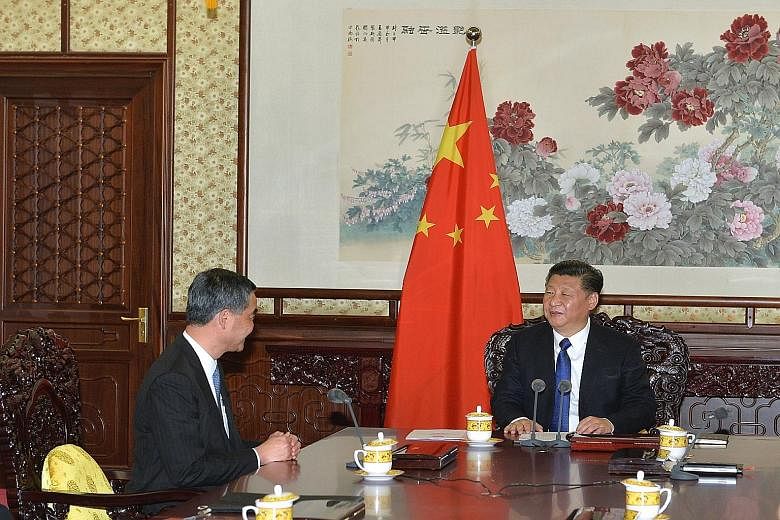BEIJING • Chinese President Xi Jinping has said in a meeting with Hong Kong's leader that China will stick steadfastly to the "one country, two systems" model used to administer the city, media reports said.
However, it was the seating arrangement of the meeting in Beijing on Wednesday that got the Hong Kong media's attention.
The South China Morning Post (SCMP) reported yesterday that it left no doubt that one country comes before two systems.
It noted that Mr Xi was seated at the head of a long conference table, with Hong Kong Chief Executive Leung Chun Ying sitting at one side next to Mr Wang Guangya, director of the State Council's Hong Kong and Macau Affairs Office.
The seating plan was the same for Mr Leung's meeting with Chinese Premier Li Keqiang, the paper said.
The arrangement contrasted with that of Mr Leung's previous duty visits to the capital, when he was always seated side by side with state leaders, giving the impression of equal footing.
Mr Leung himself later acknowledged the significance of the changed seating arrangement, the SCMP reported, saying it "reflects the constitutional position of Hong Kong and the central authorities".
The seating protocol has not escaped the attention of Hong Kong politicians.
Democratic Party leader Emily Lau said the new seating protocol was unnecessary and degrading, serving only to add to existing fears about the future of one country, two systems.
"People would only have a stronger impression that Leung has failed to uphold the city's high degree of autonomy," Ms Lau was quoted as saying by the SCMP.
Lawmaker Wong Kwok Kin of the pro-Beijing Federation of Trade Unions said the move "highlighted... the subordinate role" of Hong Kong.
"Beijing did not stress its role in the early years after the handover to avoid scaring off Hong Kongers, but the central government has changed its policy in the wake of the Occupy protests and the failed political reform," he told the SCMP.
During his talk with Mr Leung, Mr Xi noted that "new circumstances" had arisen regarding one country, two systems, both in Hong Kong and the international community.
The President promised that the central government would be steadfast and unshaken in its commitment to the policy and "make sure its implementation does not get distorted".
Hong Kong was hit by 79 days of protests last year, when activists "occupied" highways and streets to demand full democracy in what amounted to the biggest political challenge to Beijing's Communist Party leaders in years.
The protests failed to persuade China to allow a fully democratic vote for Hong Kong's next leader in 2017.
Beijing says voters have to choose from a list of pre-approved candidates.
In a separate meeting with Macau Chief Executive Chui Sai On, Mr Xi repeated calls for an "appropriate diversification" of Macau's economy, Reuters reported. Macau's casino business makes up more than 80 per cent of government revenue.
Like Hong Kong, Macau is ruled under the one country, two systems model that offers residents wide- ranging personal freedoms that do not exist on the mainland. Critics say these freedoms have been eroding under pressure from China.

